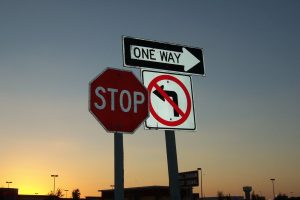Setting the clocks back an hour brings with it early darkness and an increased risk of car accidents, particularly those involving pedestrians.
There has been much debate about Daylight Savings Time, with many favoring setting the clocks and eliminating the twice-yearly changing of time. Advocates for permanent Daylight Savings Time, which brings more light to early evening hours, cite a reduction in car accident risks and more time for residents to shop, dine and spend money at local businesses. 
But it’s a debate that has raged for decades and still we deal with early darkness each fall.
Our car accident lawyers in Fort Myers and Cape Coral know the risks of traffic accident does increase with early darkness. This is particularly true for those involving pedestrians. This year, we are already dealing with the aftermath of Hurricane Ian and the bumper-to-bumper traffic that has arrived well before the start of season. Whether tourist season brings more traffic remains to be seen as many tourism destinations work to rebuild. But what is not up for debate is driving in early darkness makes it more difficult to see hazards, including walkers, cyclists and motorcycle riders.
Healthline reports an annual spike in fatal car crashes following the autumn end to daylight savings time. When clocks go back an hour, motorists are often forced to drive the evening commute at twilight or even in full darkness. The change also results in sleep deprivation for some motorists, increasing the risk of drowsy driving collisions.
Here are some tips from our Fort Myers car accident attorneys for reducing your risks:
- Pay particular attention for pedestrians at intersections, near school zones, and while driving on neighborhood streets. Always give them the right of way. The few extra seconds is well worth it when it comes to reducing the risk of being blamed for striking a pedestrian, which almost always results in very serious or fatal injuries, even at low speeds.
- Have your vehicle serviced. Florida’s year around sunshine does not bring a change of seasons to remind motorists to have an annual service and safety check completed. Not only will such service work reduce your risks of breaking down at night, it will also check to make sure all of your lights are working properly and that your headlights are properly aligned.
- Have an eye exam. Many of us postponed non-essential doctor appointments and wellness checks during COVID. But having your eyes checked and updating your eyeglass prescription is among the best things you can do to reduce your driving risks. Having anti-glare coating put on your glasses can also help with night vision.
- Get plenty of rest. There is plenty of evidence that the time change has a bigger impact on older adults, who are already at increased accident risks. Making sure you get plenty of rest is critical.
- Avoid night driving whenever possible. Night is always the most dangerous time for serious and fatal accidents. But the month following the time change is even more dangerous. You can do everything right and still be injured in a collision with an at-fault motorist.
We wish you a joyous start to the holiday season. We have spent half a century living and working beside you here in Southwest Florida. We are all working to recover from the hurricane. We have been heartened by the stories of neighbors helping neighbors but know many of us still have a long way to go. Be kind. Do your part. Safe driving is just one more way you can help our community.
If you or a loved one is injured, call Associates and Bruce L. Scheiner, Attorneys for the Injured, at 1-800-646-1210.
 Florida Injury Lawyer Blog
Florida Injury Lawyer Blog





